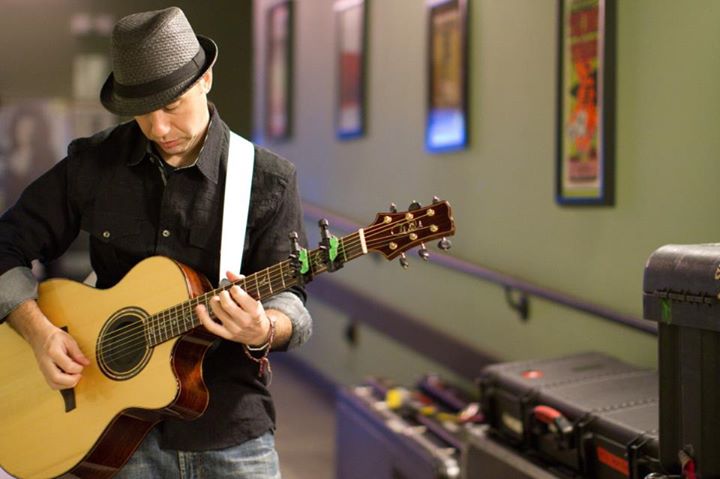Steve Vai Guitarist Dave Weiner on Zen and the Spiritual Side of Playing Guitar

Guitarist Dave Weiner has been a part of Steve Vai’s band since 1999, touring the world with him and recently opening his shows in front of European audiences.
This gave him a chance to showcase songs from his third solo album, A Collection of Short Stories: Vol. 1. Recorded at home with his acoustic guitar, the project was a first for Weiner, and was both fulfilling and challenging.
A graduate of the Guitar Institute of Technology, Weiner has received four Grammy nominations for his work as a guitarist and engineer on some of Vai’s albums. He also created and hosts Riff of the Week, an educational Web series that has millions of followers, and teaches guitar online.
GUITAR WORLD: Can you describe the dynamic and interplay between the band members?
Fortunately, we’ve been playing together for a very long time. Philip Bynoe [bass] was here before I was. He was in the band from 1996 until 2000, then he came back in 2007 for the last part of that tour, and he’s been with us for the last two years.
Jeremy Colson [drums] joined in 2004, I believe. We know each other very well. We can read off of each other personally and musically onstage and we’re all in tune with what Steve requires and needs.
At those moments of surprises, for instance when a guitar string breaks, we know what needs to happen. As a unit, we’re pretty tight, and for the difficulty that this music presents, we are happy with the results night after night. Everyone makes a mistake here or there during the show, but this show has a million notes, and if one or two are off, who cares?
Get The Pick Newsletter
All the latest guitar news, interviews, lessons, reviews, deals and more, direct to your inbox!
Probably the most profound part of this band is we focus a lot on the spiritual side of playing music and living in each note, being very present in each note, in each moment, as it’s going by. Many musicians go through a period in their career where if they make a mistake, they dwell on that for the rest of the show. It ruins the rest of the show for them, and that’s very readable by the audience. That’s living in the past. The spiritual thing, the Zen thing, we focus on it a lot. We talk about this and we put it into practice nightly.
We play a lot — having a day off today when we had a day off on Monday is unheard of. We have a show tomorrow and another day off. That’s a first in the 14 years that I’ve toured with Steve. It’s usually six shows and a day off. Because of that frequency of shows, we have the opportunity to put what we discuss into practice night after night, so at this point we’re well versed in this mentally of “If you make a mistake, it doesn’t matter at all.” Most of the time, the audience doesn’t know. You have to get past it in your mind, live in the next note and the next note, let time go by, and enjoy every moment of it. That’s not only onstage, but in life in general.
That’s a very difficult thing to do, but if you can wrap your mind around it and put it into practice, you’ll generally find that you live happier because you're not dwelling on things in the past or stressing about what may happen in the future. As a life concept, it works well. Putting it into the musical context, it’s what we, as a band, try to work on and it’s very unique. I haven’t been in too many musical situations where everyone is focused on that kind of idea.
How long did it take you to reach that point? Did it come from working with Steve or is it something you taught yourself over the years?
It’s a bit of both, but I would say Steve is definitely the catalyst. He is very spiritual. He focuses not on religion but on the Zen approach to life and looking at the teachings of many spiritual leaders — and in that sense, religious leaders as well — and what the underlying principal is, and it’s all the same. It’s trying to live happily, stress-free, how does that happen, and it comes down to not living in the past or the future. It’s being present. Steve has been practicing it for decades, and he has brought it to life for me and probably the other guys as well.
When I’m not on tour with Steve, I’m still investigating, delving deeper and putting these concepts into practice in my own life. It’s difficult, but it provides results for me. It makes sense.
A lot of people will dismiss the more Zen and spiritual concepts because it’s lofty, it’s kind of out there for many people, but once you dismiss the superficiality of it, the nonsense purview on it, it makes perfect sense and it’s something to investigate. It was for me. I’m in a “live and let live” kind of world, whatever works, but this stuff seems to have a positive impact in my life, personally and musically, and Steve is a big catalyst for proliferating that.
You have an accounting degree. How is that helpful in managing your career?
I got that just to have a backup plan, but I will never be an accountant. I know how to keep track of finances, I know how to be smart with money, I know that I certainly can’t spend more than what comes in, and even then, if you want to build a business, you have to save. So, financially, I’m smart about things, and yes, the degree helped. I also spent a year abroad studying international finance and commerce. It put a better financial head on my shoulders.
Are your students more interested in electric or acoustic guitar? Do you encourage students of one to explore the other?
Yes. A lot of players start on acoustic because it’s physically more challenging than electric, and I tend to agree with that. That’s the physical side of things. You can get your hands trained a little quicker on an acoustic than on electric, but I don’t play an acoustic like I play an electric, and that’s the difference. That’s creating different kinds of habits. It’s apples and oranges.
As always, it comes down to what is desired. What is the goal? That’s what I always ask: What do you want to do? What’s your end game? Let’s get on that path and make it happen. If your end game is to make a nice, versatile record, maybe you put some acoustic on there as well as some electric. On both of my electric records, I have some acoustic guitar. It just depends on what the person wants.
Read more of Dave Weiner’s interview here.
Alison Richter interviews artists, producers, engineers and other music industry professionals for print and online publications. Read more of her interviews at examiner.com.
Alison Richter is a seasoned journalist who interviews musicians, producers, engineers, and other industry professionals, and covers mental health issues for GuitarWorld.com. Writing credits include a wide range of publications, including GuitarWorld.com, MusicRadar.com, Bass Player, TNAG Connoisseur, Reverb, Music Industry News, Acoustic, Drummer, Guitar.com, Gearphoria, She Shreds, Guitar Girl, and Collectible Guitar.
“I loved working with David Gilmour… but that was an uneasy collaboration”: Pete Townshend admits he’s not a natural collaborator – even with bandmates and fellow guitar heroes
“This guy kept calling saying, ‘I’ve never been in a band before, but I’m the best guitarist ever.’ When I heard him play it was like a fire from heaven”: The life and times of Killing Joke visionary Geordie Walker – the guitar hero’s guitar hero







![[from left] George Harrison with his Gretsch Country Gentleman, Norman Harris of Norman's Rare Guitars holds a gold-top Les Paul, John Fogerty with his legendary 1969 Rickenbacker](https://cdn.mos.cms.futurecdn.net/TuH3nuhn9etqjdn5sy4ntW.jpg)


